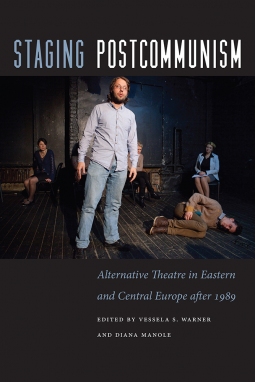
Staging Postcommunism
Alternative Theatre in Eastern and Central Europe after 1989
by Vessela S. Warner; Diana Manole
This title was previously available on NetGalley and is now archived.
Send NetGalley books directly to your Kindle or Kindle app
1
To read on a Kindle or Kindle app, please add kindle@netgalley.com as an approved email address to receive files in your Amazon account. Click here for step-by-step instructions.
2
Also find your Kindle email address within your Amazon account, and enter it here.
Pub Date Jan 01 2020 | Archive Date Feb 01 2020
University of Iowa Press | University Of Iowa Press
Talking about this book? Use #StagingPostcommunism #NetGalley. More hashtag tips!
Description
Contributors: Dennis Barnett, Dennis C. Beck, Violeta Decheva, Luule Epner, John Freedman, Barry Freeman, Margarita Kompelmakher, Jaak Rahesoo, Angelina Ros¸ca, Ban¸uta Rubess, Christopher Silsby, Andrea Tompa, S. E. Wilmer
Advance Praise
“Staging Postcommunism opens the door on an area of the world where theatre vibrantly looks to answer the sociological, political, and personal issues of identity that emerged following the breakup of the Soviet Union.”—Marc Robinson, St. Olaf College
“Staging Postcommunism makes an important contribution to the field in a number of dynamic modes. This fills a significant gap in the scholarship, addressing a wide range of nations and cultures in Eastern and Central Europe, whose extensive and influential theatre histories of the twentieth century to the present day are still woefully underrepresented in English-language scholarship. I read the book with great enthusiasm.”—Bryce Lease, author, After ’89: Polish Theatre and the Political
Available Editions
| EDITION | Other Format |
| ISBN | 9781609386771 |
| PRICE | $90.00 (USD) |
| PAGES | 298 |
Average rating from 2 members
Featured Reviews
 Willy M, Reviewer
Willy M, Reviewer
This is more of a work for the diaspora than for those in Post Soviet eastern Europe. That said it has a lot of detail, which the reader who is interested in this subject will be grateful for. For this alone its worth getting a copy. As a reference it will be indispensable as finding other sources for so many countries is impossible.
That said there are some natural draw backs. Draw backs that might actually be seen as benefits. This is an anti-communist, anti-Soviet, Pro-Western, Pro-Liberal set of essays by western or western oriented Intelligenzia. Yes this is the coloured revolution cheer leaders writ large. I'm not saying this to disparage them, not in the least. Rather its an interesting view of the struggle for relevance, in the face of a damning void which most of those who are part of this Intelligenzia have faced.
The Intelligenzia in these societies, and particularly the theatre, were the harbingers of the fall of the Soviet Union and the liberation of Eastern and Central Europe. In their wake came massive poverty, brutal and bloody crime, civil wars and finally the rise of a hardened Nationalist crusade that has so many echoes of fascism its almost indistinguishable from it. So those that raised the banner of the descent into hell, felt themselves sorely lacking in connection to the people, and their relevance was at an all time zero. The Intelligenzia were lost to the world and the world of theatre, lacking money and reason to exist declined.
But as you can read in these essays, the world of Eastern European / Post-Communist theatre has but died a little and has come back resurgent. This book shows in tortuous detail how the theatre directors, actors and playwrights have molded themselves from the post-communist, anti-communist, post-modern malaise to once again relate to the experiences of society. Why? Because there is a rich tradition that questions and develops with all the historical baggage, its not dragged down by it, but rather throws it all on the stage. The confusion of the people, the lack of progress, the lack of spiritual fulfillment and the disconnection to history, are all great themes we see in the theatres of these respective countries.
Has the population forgiven the fools who led them into a disaster? Perhaps not, but they certainly love the fooling on the stage. I recommend this book because it gives some scope to a theatrical world come back into its stride. This is a theatrical tradition which has been the source of so much energy and ideas to world theatre over many centuries. Because of that, this is an important book.



